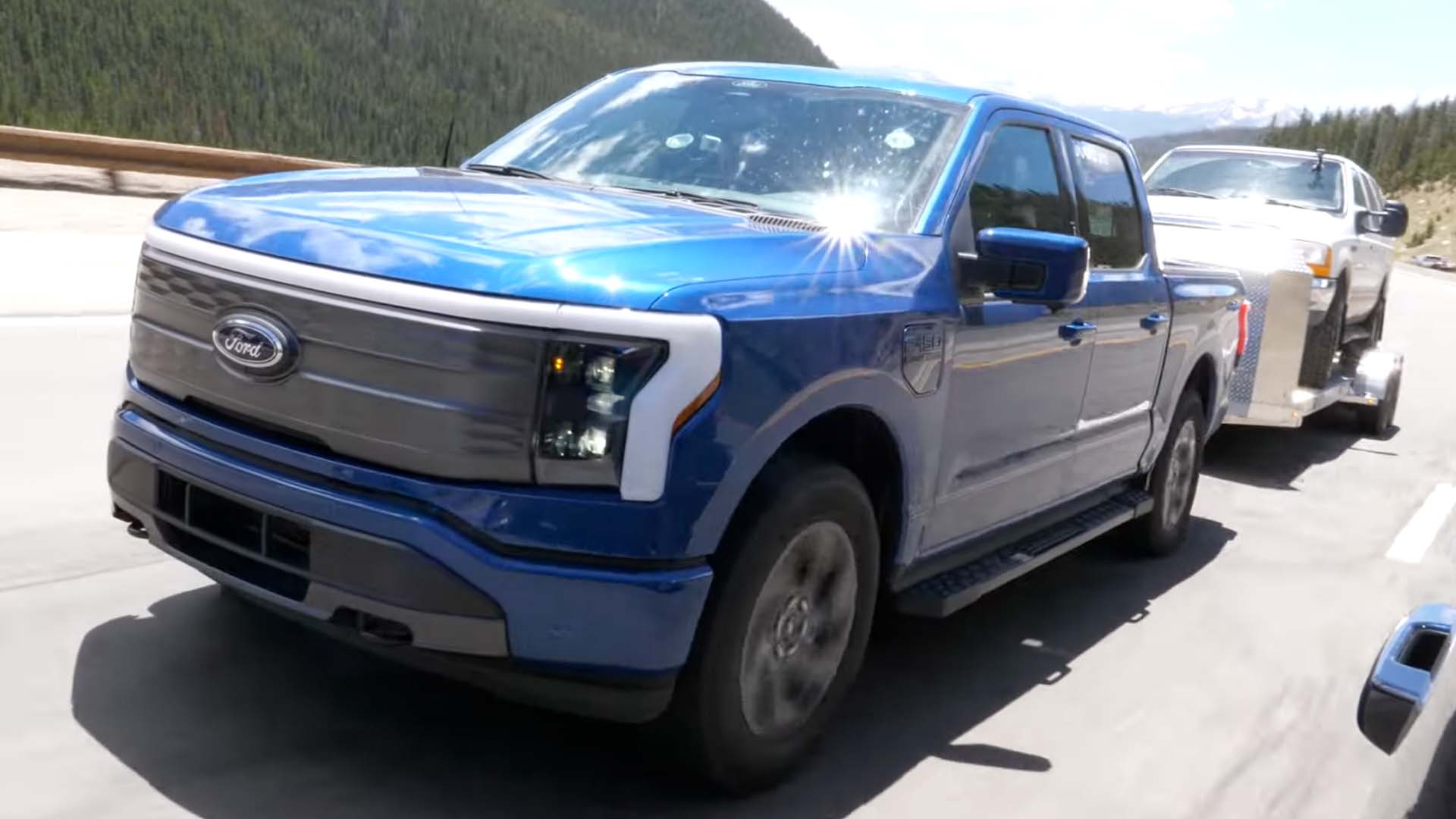

I’d say it’s fair to call the 2022 Ford F-150 Lightning this year’s most buzzed-about vehicle. Even then, that hype only goes so far without real-world data to back it up. There are plenty of skeptics that doubt electric pickups, and even though I’ve heaped praise on their potential, I don’t expect everyone to take my word for it. Tough tests like this one, then, where the F-150 Lightning tows 9,600 pounds up and down Colorado’s Eisenhower Pass, provide some of the clearest info yet.
The trial was conducted by the crew at TFL Truck, who has completed more than 140 trips on the so-called Ike Gauntlet. Essentially, they tow a trailer down the eight-mile stretch of Interstate 70—which starts at roughly 11,158 feet above sea level—while counting the number of brake applications required to stay at a set speed. Then, they whip around and tow the same load uphill, measuring the truck’s pulling performance.

In this case, the F-150 Lightning is dragging around a tandem-axle trailer with a 2000 Ford Excursion V10 on it. There are definitely more aerodynamic setups out there, but this is a fairly realistic load for anyone looking to use up the Ford’s 10,000-pound max towing capacity. We’ve already seen that the EV can manage the feat—on this same road, even—but there was no publicly released data to work with before. Now, there is.
Plainly put, the F-150 Lightning aced the downhill portion. Once they left off the accelerator at 50 miles per hour, not a single brake application was made; for reference, the F-150 PowerBoost hybrid required 11 brake applications on the same route while overrunning to 60 mph. This success was thanks to the truck’s regenerative braking, which actually fed 11 miles of range into the battery, extending it from 98 miles at the start to 109 when all was said and done. So not only was the tow vehicle totally composed, maintaining speed and stability with its nearly 50/50 weight distribution, but it could also drive further at the end of the run than before it set off.
The F-150 Lightning continued to impress when it was time to pull the Excursion back up the way they came, chirping the tires as it merged back onto I-70. Batteries and electric motors are relatively unaffected by elevation, which meant it could chug up toward the Continental Divide without batting an eye. It quietly cruised at 60 mph whereas the hybrid model turned 4,000 rpm most of the way. What’s more, the F-150 Lightning’s direct drivetrain never heated up past the gauges’ halfway point, and the same couldn’t be said for the hybrid.
As expected, this depleted the truck’s range in a hurry. It started the climb with a 69 percent state of charge and completed it with just 53 percent left, meaning it used 21 kilowatt-hours of battery capacity to finish the eight-mile ascent. That equates to .38 miles per kWh in the real world, despite the truck reading .5 miles per kWh; regardless, that’s a heavy hit. And while there’s no denying that gas and diesel trucks also face huge mileage decreases—the hybrid F-150 managed 3.9 mpg gong up, according to its own dashboard—they can refuel in a jiffy. An F-150 Lightning with the Extended Range battery takes 44 minutes to charge from 15 percent to 80 percent on a 150-kw charger, and places to plug in are still few and far between compared to gas stations.

You could argue that the methodology is imperfect, but I think this gives a real representation of the towing experience with an EV. It’s fantastic while you’re on the road, accelerating as soon as you need it to and managing the load even better than its internal combustion equivalent; however, you’ll spend a lot more time parked if you’re on a road trip given the range depletion and lack of public charging options. There are two sides of the coin when it comes to working the Ford F-150 Lightning and indeed any other battery-powered truck, so there’s no one-size-fits-all answer regarding whether or not it’ll work for you.
Let’s just hope that, in time, we’ll have the infrastructure to back up all this capability.
Got a tip or question for the author? Contact them directly: caleb@thedrive.com